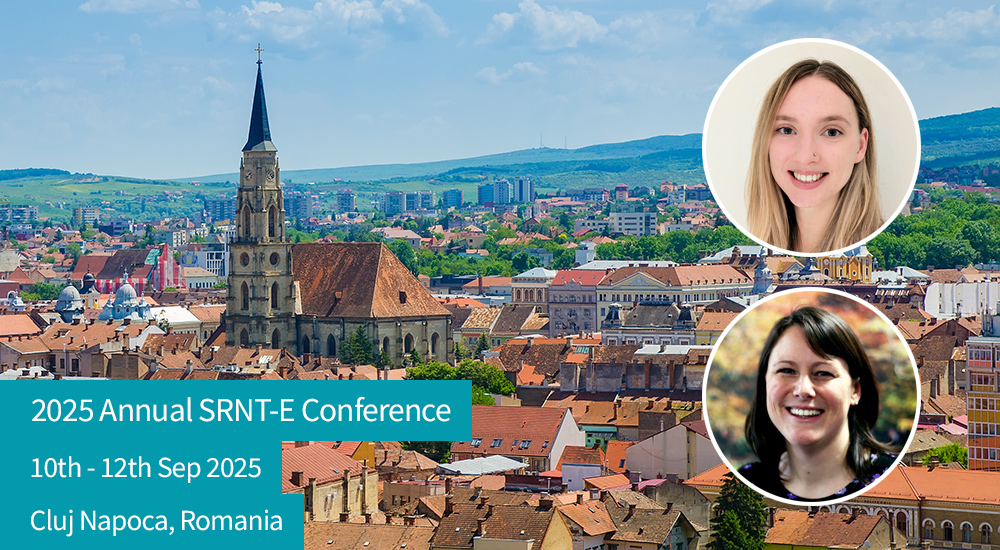SARG researchers to present at European nicotine and tobacco conference

Two researchers from the Sheffield Addictions Research Group (SARG), Esther Moore and Professor Hazel Squires, will present their latest findings at the annual conference of the European Chapter of the Society for Research on Nicotine and Tobacco (SRNT-E).
The conference, which brings together leading experts from across Europe and beyond, will be held in Cluj-Napoca, Romania, from 10 to 12 September 2025. The SRNT-E aims to advance understanding of nicotine and tobacco with the ultimate goal of reducing the harms associated with their use.
Evaluating the 'Swap to Stop' programme
Esther Moore will present as part of a symposium entitled 'A national initiative to provide free vapes for smoking cessation – early findings'. Her presentation, 'Swap to Stop: Evaluation of proposals to provide vaping devices for smoking cessation in England and an initial return on investment calculation' will provide early insights from an evaluation of the government's 'Swap to Stop' programme, an initiative which aims to offer a million smokers a free e-cigarette starter kit to help them quit.
Esther's work focuses on the public health and economic implications of the scheme, and the findings will be crucial for informing future public health strategies on smoking cessation. The evaluation is led by King's College London as part of the NIHR Policy Research Unit in Addictions, a programme of work that SARG is a key partner in.
Modelling e-cigarette policies
Professor Hazel Squires will present at a symposium on the 'Scoping of Policy Impacts for Regulating E-cigarettes (SPIRE): a data and decision-analytic model mapping project'. This session will present the latest work from the SPIRE project, which aims to identify what data and research would be most useful for creating mathematical models to inform future e-cigarette policies.
The symposium will also include presentations from fellow SPIRE researchers Dr Loren Kock on evidence identification and Professor Lion Shahab on recommendations from the project.
-
New research shows that spending less on tobacco, gambling and sweets is good for the UK economy
A new study from the Sheffield Addictions Research Group (SARG) has found that public health policies which reduce spending on harmful products can actually provide a significant boost to UK jobs and the wider economy.
-
SARG researcher Dr Parvati Perman-Howe secures NIHR Career Development Award
We are delighted to announce that Dr Parvati Perman-Howe, a Research Associate within the Sheffield Addictions Research Group (SARG), has secured a highly sought-after Career Development Award.
-
Professor John Holmes contributes to major new report outlining actions to tackle alcohol harm
SARG Director Professor John Holmes was part of an expert panel that supported the development of 'A Healthier Future: A long-term vision to tackle alcohol harm in the UK', a significant new report published by the Institute of Alcohol Studies (IAS) this week.
-
SARG researchers present on economic modelling and wastewater surveillance at European Public Health Conference
Two researchers from the Sheffield Addictions Research Group (SARG), Dr Charlotte Head and Dr Esther Chanakira, will showcase innovative local-level tools for policy design, including economic modelling and wastewater surveillance, at the European Public Health (EPH) Conference in Helsinki from 11–14 November 2025.
You might also be interested in…
-
QUIT Programme Evaluation
Yorkshire Cancer Research commissioned the Sheffield Centre for Health and Related Research (SCHARR) at the University of Sheffield to carry out a comprehensive evaluation of hospital-based stop smoking services in the region, starting with the Quit programme.
-
STAPM
The Sheffield Tobacco and Alcohol Policy Modelling Platform (STAPM) research programme aims to identify and evaluate approaches to reducing the harms caused by tobacco and alcohol consumption. By providing policymakers with evidence-based insights, STAPM seeks to improve public health policymaking and commissioning.
-
Targeting multiple levels of 'the smoking cessation system' using novel scientific approaches
This programme will develop and apply novel scientific approaches to increase the population rate of smoking cessation.
